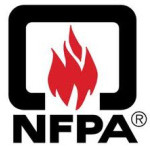- Industry: Fire safety
- Number of terms: 98780
- Number of blossaries: 0
- Company Profile:
Established in 1896, NFPA's mission is to reduce the worldwide burden of fire and other hazards on the quality of life by providing and advocating consensus codes and standards, research, training, and education.
Harmful behaviors and/or actions, as defined by local law, that place an individual at risk and require reporting.
Industry:Fire safety
Halons include bromochlorodifluoromethane (Halon 1211), bromotrifluoromethane (Halon 1301), and mixtures of Halon 1211 and Halon 1301 (Halon 1211/1301).
Industry:Fire safety
Halocarbon agents include hydrochlorofluorocarbon (HCFC), hydrofluorocarbon (HFC), perfluorocarbon (PFC), and fluoroiodocarbon (FIC) types of agents.
Industry:Fire safety
Hallways, corridors, passages, or tunnels used as exit components and separated from other parts of the building in accordance with NFPA 101, LifeSafetyCode.
Industry:Fire safety
Ground vehicles used in the suppression of wildland fires, such as dozers, tractors, plows, and their transport vehicles. Heavy equipment does not include fire apparatus.
Industry:Fire safety
Granules, dusts, fines, ultra fines, and other substances defined according to the specific metal.
Industry:Fire safety
Grease, solids, liquids, and other floatable material removed from settling tanks.
Industry:Fire safety
Grain materials, such as cereal grains, oilseeds, and legumes, that have not undergone processing or size reduction.
Industry:Fire safety
Glazing systems installed in fire-rated bulkhead or overhead assemblies that have been tested to achieve specified fire resistance ratings.
Industry:Fire safety
